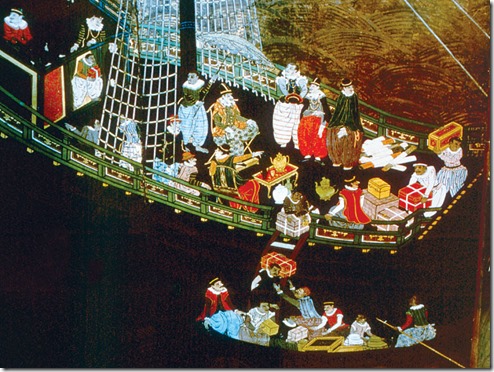The Portuguese first made contact with Japan in 1543. This started the Nanban Trade Period which extended several decades. During this time, the Portuguese introduced tempura and refined sugar to Japan. Sadao Mazuka wrote to me about some of these culinary influences…
Konpeito (金平糖 = confeito [Portuguese] = comfit [English]);
 When I was young I had Konpeitos many times. They’re a type of rock candy that Japanese people learned how to make from the Portuguese that stayed in Nagasaki in the 16th century.
When I was young I had Konpeitos many times. They’re a type of rock candy that Japanese people learned how to make from the Portuguese that stayed in Nagasaki in the 16th century.
But I don’t think Japanese children eat such candy recently. There are various other kinds of candy and sweets in many shops.
According to Wikipedia, "Konpeitō is also the standard of the thank-you-for-coming gift which is given by the Imperial House of Japan. The gift of konpeitō comes in a small box called bonbonieru (Japanese: ボンボニエール), from the French bonbonnière, meaning candy box.".
Kasutera (カステラ = Castella → Castela [in Portugal pronunciation])
![clip_image002[6] clip_image002[6]](https://www.mamalisa.com/images/blog/clip_image0026_thumb.jpg) I think “Castella” is an area name in Spain. That’s where the name of the cake comes from. Kasutera is a kind of sweet sponge cake here. It originated in Nagasaki, Japan. But the bakers in Nagasaki learned how to make sponge cake from the Portuguese I think.
I think “Castella” is an area name in Spain. That’s where the name of the cake comes from. Kasutera is a kind of sweet sponge cake here. It originated in Nagasaki, Japan. But the bakers in Nagasaki learned how to make sponge cake from the Portuguese I think.
Anyway it is quite delicious cake. So we eat it sometimes.
And there are so many Japanese words that originated from Portuguese. See some of these loan words at the link below…
Glossary of Japanese words of Portuguese origin
Thanks for sharing this with us Sadao!
Mama Lisa
Images:
This article was posted on Monday, April 11th, 2016 at 6:50 pm and is filed under Candy, Countries & Cultures, Desserts, Japan, Portugal, Recipes of the World. You can follow any responses to this entry through the RSS 2.0 feed. You can skip to the end and leave a response. Pinging is currently not allowed.


























April 12th, 2016 at 12:47 pm
The name comes from “pão de Castela” which means “bread/loaf from Castile” in Portuguese. Castile is “Castilla” in modern Spanish (“Castella” in old Spanish). It means “land of castles” and is the area the Spanish language name comes from: “Castellano” (Castilian).
July 4th, 2016 at 9:10 am
Also the word to say thank you : arigato comes from the Portuguese obrigado
July 5th, 2016 at 1:26 pm
That’s interesting Nana! I didn’t know that.
December 15th, 2016 at 10:14 am
I had thought that arigato came from the Portuguese but Wikipedia disagrees:
https://en.wikipedia.org/wiki/Glossary_of_Japanese_words_of_Portuguese_origin
But there are dozens more that did.
March 27th, 2018 at 11:37 pm
Arigatou does *not* come from Portuguese.
Arigatou comes from ari “to be” and -gatai (hard to …).
So the adjective arigatai means something along the lines of “hard to exist”
Something that is rare or does not happen often but is nice when it happens is arigatai.
Arigatou is the adverb form of arigatai (which would normally be arigataku, but went through a sound change where it lost the k and the au combined to be ou)
Arigatou gozaimasu is essentially saying “It is hard to exist” in a polite way
Remove “gozaimasu” (respectful to be) and you have yourself “arigatou”